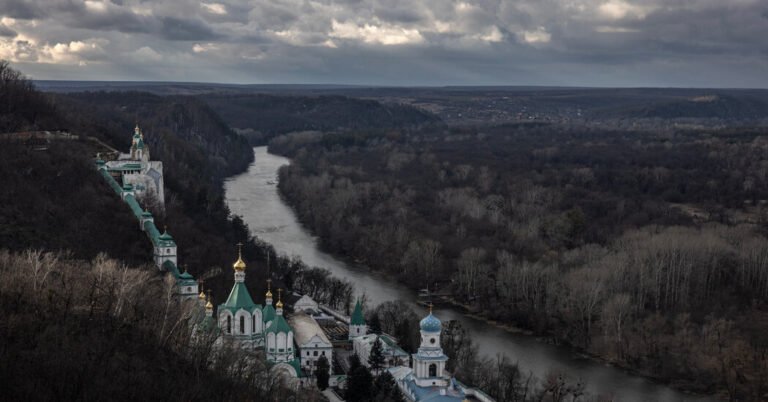
Ukraine’s Parliament passed a bill on Tuesday creating a legal path to ban a Russian-aligned branch of the Orthodox church, furthering a long, post-Soviet split between two of the world’s largest Orthodox communities.
Ukrainian officials have accused the church of aiding in influence operations and espionage during the country’s war with Russia.
The schism between the two churches has been a backdrop to the war. Orthodox Christianity is the most prevalent religion in both Russia and Ukraine, and until the Soviet breakup both belonged to the same hierarchy, under the patriarch in Moscow. The Orthodox Church of Ukraine broke from the Russian church more than 30 years ago, and answers to a prelate in Kyiv, but many parishes in Ukraine opted to remain aligned with the Russian church.
The lingering presence of the Russian-aligned branch of the church has posed a tangle of national security and religious freedom issues for Ukraine’s government as some of its priests have supported the Russian invasion. The government in Kyiv has shifted some holy sites to Ukrainian church control, and hundreds of local parishes have switched allegiances.
The bill passed on Tuesday though, would go a step farther.
If signed into law by President Volodymyr Zelensky, it could lead to a legal ban on the Russian-aligned church. The bill prohibits a religious organization from maintaining ties with a government at war with Ukraine, and singles out the Russian Orthodox Church for supporting the invasion and being “an accomplice in war crimes and crimes against humanity.” It would also establish a committee to determine whether local churches are violating Ukrainian law by maintaining ties with the Moscow patriarchate.
Mr. Zelensky is Jewish and not a member of any branch of Orthodoxy. But he has been supportive of national security controls on the Russian church’s activities and is expected to sign the bill.
The Russian-aligned church, which still represents millions of Ukrainians, insists that it cut ties with its Russian hierarchy at the onset of the war. But the independent Ukrainian church calls that break insincere and flatly condemns its counterpart for not making a real break with Moscow.
Religion has infused Russia’s conflict with Ukraine from its earliest stirrings. In 2014, a Russian commando team sheltered in a monastery before igniting the first violence in the conflict as Russia fomented an uprising in eastern Ukraine in 2014. The leader of the Russian Orthodox Church, Patriarch Kirill, blessed the Russian invasion in 2022.
And an archimandrite, or top religious official, from the southern Ukrainian region of Kherson attended a Kremlin ceremony when Russia claimed to annex the region. The Ukrainian police have arrested or investigated several dozen priests for espionage or spreading Russian propaganda.
A spokesman for the Russian-aligned church in Ukraine, Metropolitan Kliment, said in an interview that the bill was an infringement on religious freedom. The church, he said, had no legal links to the Russian Orthodox Church based in Moscow and its canonical ties should not be parsed by a secular government.
“This law violates basic constitutional principles” for Ukraine, he said, and likened the crackdown to the Soviet Union’s history of repression of the religions.
A majority of Ukrainians support banning the Russian-aligned branch of the church. A poll in April by the Kyiv International Institute of Sociology, for example, found 63 percent of Ukrainians favor outlawing it.
“They don’t see banning this church as a question of religious freedom,” said Anton Hrushevsky, the institute’s director. “They associate the church with the Russian government.”
The bill’s complex mechanism for banning a religious organization by first forming a committee to study its activities means any legal prohibition is months or years away, he said. The bill, he said, came as more of a “symbolic step” that would push local parishes to break ties with Russia on their own, accelerating a process already underway in Ukraine since Russia’s invasion. Under Ukrainian law, parishes can choose their affiliation in a local vote.